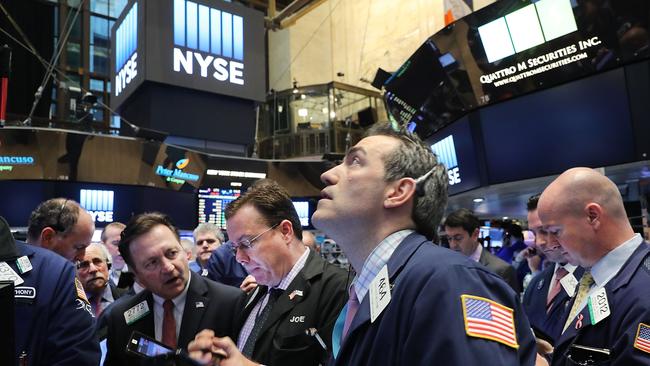Uncertain US election means day of unusual financial volatility
Investors are bracing for the outcome of the most volatile US election race in decades.

While reliable results probably won’t be known until mid-afternoon Australian time — when polls on the US west coast will be closed and the major US TV networks will start calling the result if it’s not too close — exit polling could cause significant volatility throughout the day.
Australia’s benchmark S&P/ASX 200 index yesterday ended just 0.1 per cent higher at 5257.8 points.
Online pollster VoteCastr has opted to break the US media’s traditional information embargo on live results and provide “minute by minute” projections based on exit polls.
By the time Australian markets open, enough data on the “battleground” states will be available to show the broad voting patterns.
By early afternoon, the bulk of the 50 US states will be finished voting and markets should know if Hillary Clinton is heading for a victory or if Donald Trump has pulled off a win.
Assuming the election result is clear enough, it will finally allow investors to decide whether to deploy cash that’s been building up for three months.
But the only result market professionals are comfortable with is the anticipated narrow win by Clinton that leaves Republicans in control of the House of Representatives. While it probably wouldn’t be as destabilising as a Trump victory, a Clinton clean sweep could hamstring the US sharemarket for some time as investors would expect some tough reforms that could weigh on the US financials, energy and healthcare sectors.
Former Reserve Bank board member Warwick McKibbin said at a Monash-Economic Society of Australia forum yesterday: “(Clinton) may not be a good president for Australia’s interests, especially if the Democrats in congress swing her even further to the left, potentially damaging trade policy and further threatening the fragile global economy.”
Trump is ostensibly pro-business — he plans to slash US corporate taxes to a flat rate of 15 per cent — but many analysts fear his nationalistic and anti-trade policies could spark a savage one to three-day sell-off of 5-10 per cent in the US sharemarket — if he scrapes across the line.
Of course, the recent narrowing in opinion polls following the reopening of an FBI probe into Clinton’s emails coincided with a nine-day sell-off in the US S&P 500 — the longest losing streak in the benchmark share index since 1980. If not for Monday’s decision by the FBI to absolve Clinton from any wrongdoing — pushing the S&P 500 up 2.2 per cent and marking its best rise in seven months — one could argue that investors had largely hedged against a Trump victory. But with the CBOE VIX — the “fear index” — falling back to the long-term average of 19 per cent, the market is not factoring in a Trump win, even if it’s not ruling out that possibility altogether.
Assuming no more tough talk about sacking Federal Reserve chair Janet Yellen, on a Trump victory investors are likely to favour large domestically focused US companies that will benefit from lower US tax rates while being less exposed to a potential trade war with China. At the top of the list would be any healthcare, energy and financial stocks that have been fazed by Clinton.
If markets are faced with a “worst case” scenario — a Trump clean sweep together with further posturing, including attacks on Yellen — then investors will turn to the safety of gold, particularly since the US dollar would probably suffer from the prospect of further delays in US interest rate increases, giving the yellow metal a free kick.
Mark Connelly, who sits on the board of several gold companies as well as mining services group Ausdrill, told The Australian that the recent volatility in gold was likely to continue regardless of the election outcome.
“Either candidate brings different perspectives to the gold price. You could have volatility with Trump as president or you could have volatility with Clinton. If she goes on a spending spree for all these social programs, the dollar is going to go down again and gold could be the currency of choice,” Connelly said.
The Mexican peso could see one of the biggest reactions to the US election outcome, particularly versus safe havens such as the Japanese yen and Swiss franc.
Additional reporting: Andrew White, Paul Garvey








Investors are bracing for the outcome of the most volatile US election race in decades.